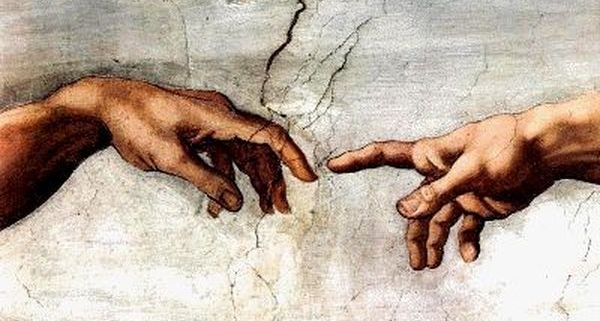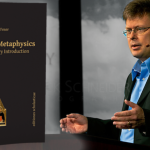A First Without a Second: Understanding Divine Causality
by Dr. Edward Feser
Filed under The Existence of God
NOTE: Dr. Feser's contributions at Strange Notions were originally posted on his own blog, and therefore lose some of their context when reprinted here. Dr. Feser explains why that matters.
For the Thomist, to say that God is the First Cause of things is, first and foremost, to say that He is the cause of their existence at every moment at which they do exist. God creates things out of nothing precisely in the act of conserving them in being, and apart from His continual causal action they would instantly be annihilated. You, the computer you are using right now, the floor under your feet, the coffee cup in your hand—for each and every one of these things, God is, you might say, “keeping it real” at every instant. Nor is this causal activity something anything else could either carry out or even play a role in. Creation—which for Aquinas means creation out of nothing—can be the act of God alone.
Where creation is concerned, then, God is the “first” cause not in the sense of coming before the second, third, and fourth causes, but rather in the sense of being absolutely fundamental, that apart from which nothing could cause (because nothing could exist) at all. As serious students of the Five Ways know, the sorts of causal series Aquinas traces to God as First Cause are causal series ordered per se, not causal series ordered per accidens. In the former sort of series, every cause other than the first is instrumental, its causal power derived from the first. (See this post for more on the subject.) But where creation is concerned, Aquinas’s talk of intermediate or instrumental causes is only “for the sake of argument”; his point is that even if there were intermediate causes of the being of things, the series would have to terminate in a First Cause. In fact, there is and can be only one Creator and He cannot in principle create through intermediaries. (That is not to say that God does not work through intermediaries in other respects. We’re only talking here about His act of causing the sheer existence of a thing or creating it out of nothing.)
Why not? Aquinas addresses the question at some length in the Summa Theologiae, the Summa Contra Gentiles, and De Potentia Dei. The arguments are difficult for someone not versed in the metaphysical presuppositions of Aquinas’s philosophical theology—indeed, some of them are difficult even for someone who is versed in the relevant metaphysics. But what follows will, I hope, suffice to convey some of the main ideas. (It will help considerably if the reader has at least some knowledge of such fundamental Aristotelian-Thomistic metaphysical notions as actuality and potentiality, form and matter, and the principle of proportionate causality; of the Thomistic arguments for the existence of God as pure actuality and as being itself rather than merely a being among others; and of the arguments for the uniqueness of anything that is pure actuality and being itself. This is all spelled out at length in chapters 2 and 3 of my book, Aquinas.)
First, then, why does Aquinas hold that only God can possibly create out of nothing?
Here’s one way to understand it. Any of us can easily actualize the potential of the oxygen in the air around us to move, simply by waving our arms. Only someone with the relevant expert knowledge could take oxygen and hydrogen and synthesize water out of them. It would take greater power still to cause the prime matter underlying oxygen, hydrogen, or water to take on the substantial form of a tree. But creation out of nothing requires more power even than that, in fact unlimited power. For it is not a case of drawing out the potentialities that are already there in a thing, but rather causing a thing to exist entirely, together with its potentialities, where nothing at all had existed before. It isn’t a case merely of modifying what already exists, but rather of causing to exist in the first place that which all mere modification presupposes.
Limited causes are limited precisely by potentialities which are not actualized. Hence a sculptor is limited by the degree of skill he has so far acquired, by the limits on his dexterity given the structure of his hands, etc. He is limited also by the potentialities of his materials—their capacity to be molded using some tools but not others, their capacity to maintain whatever shape the sculptor puts into them, and so forth. Now that which creates out of nothing is not limited by any such external factors, precisely because it is not modifying anything that already exists outside of it. But neither can it be limited by any internal potentialities analogous to the limits on a sculptor’s skill. For it is not merely causing a being of this or that sort to exist (though it is doing that too)—modifying preexisting materials would suffice to cause that—but also making it the case that any being at all exists. And only that which is not a being among others but rather unlimited being—that which is pure actualit—can do that.
The idea is perhaps best stated in Platonic terms of the sort Aquinas uses (in an Aristotelianized form) in the Fourth Way. To be a tree or to be a stone is merely to participate in “treeness” or “stoneness.” But to be at all—which is the characteristic effect of an act of creation out of nothing—is to participate in Being Itself. Now the principle of proportionate causality tells us that whatever is in an effect must be in some way in its cause. And only that which just is Being Itself can, in this case, be a cause proportionate to the effect, since the effect is not merely to be a tree or to be a stone, but to be at all.
So only God—who is pure actuality or Being Itself rather than a being among others—can cause a thing to exist ex nihilo. But why could He not work through instrumental causes in doing so? For all the preceding argument would seem to show is that Being Itself is the ultimate cause of any thing’s existing at all. That is, it suggests that any cause of a thing’s sheer existence that was less than Being Itself would, either directly or indirectly, owe its own existence to that which is Being Itself. But why couldn’t that which is Being Itself impart to other things their sheer existence through such an intermediary—through an instrumental cause which, like the effect, is merely a being among others rather than Being Itself?
Here’s one way to think about the problem with this idea. An instrumental cause causes by virtue of being used to alter what already exists, as a chisel is used by a sculptor to alter marble. But to cause the sheer existence of a thing ex nihilo is not to alter what already exists. In the case of a material thing, it does not involve causing already existing matter to take on a new form (as a sculptor does), but rather causing the matter and form together to exist. Hence while it makes sense to speak of using a chisel in the act of sculpting a statue out of marble, it makes no sense to speak of using a chisel in the act of causing a statue to exist ex nihilo. For before the statue was caused to exist ex nihilo, there was no marble on which the chisel could be brought to bear; and after the statue is caused to exist ex nihilo, there is nothing for the chisel to do, since the marble already is (by hypothesis) a statue. Now any purported instrumental cause involved in any act of creation ex nihilo would be like the chisel. It would be a fifth wheel—it wouldn’t be doing anything, and thus would not be causing anything, and thus would not really be an instrumental cause (because not a cause at all). Hence the very idea of God creating out of nothing through instrumental causes falls apart on analysis.
So, while popular images of God as First Cause have Him knocking down the first domino billions of years ago, and while even Aquinas might seem to make of Him the distant terminus of a regress of simultaneous currently operating causes, nothing could be further from the truth. God’s relationship to the world is in Aquinas’s view much more intimate than that, indeed, as intimate as possible. At least where the sheer existence of things is concerned, He and He alone is directly causing them at every instant. He is, as the Muslims say, “closer than the vein in your neck.”
Related Posts
Note: Our goal is to cultivate serious and respectful dialogue. While it's OK to disagree—even encouraged!—any snarky, offensive, or off-topic comments will be deleted. Before commenting please read the Commenting Rules and Tips. If you're having trouble commenting, read the Commenting Instructions.













